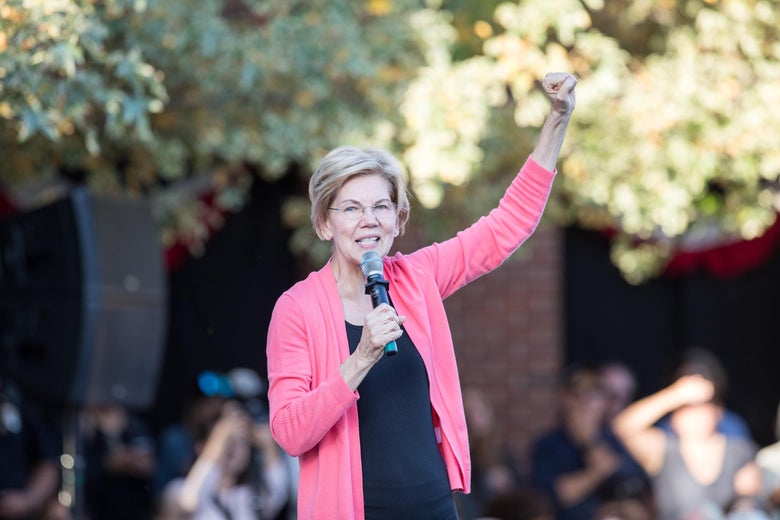
Facebook employees have given Sen. Elizabeth Warren $8,787.
Scott Eisen/Getty Images
On Tuesday, the Verge published audio recordings and transcripts from two Q&A sessions in July between Facebook CEO Mark Zuckerberg and his employees. Zuckerberg fielded a number of questions about the rise of the short-form video app TikTok as a potential competitor and the company’s battered reputation. The exchange that’s caught the most attention, however, has to do with 2020 presidential candidate and Massachusetts Sen. Elizabeth Warren’s proposal to break up big tech companies.
At one point during a Q&A, an employee asked Zuckerberg whether he was personally worried at the prospect of regulators breaking up Facebook given Warren’s candidacy and the Federal Trade Commission’s ongoing antitrust investigation into the company. Zuckerberg responded, in part, “if she gets elected president, then I would bet that we will have a legal challenge, and I would bet that we will win the legal challenge. And does that still suck for us? Yeah. Later, he added, “if someone’s going to try to threaten something that existential, you go to the mat and you fight.”
Warren quickly responded on Twitter:
If all of this sounds like Warren has officially become Facebook’s—and the tech industry’s—nemesis, there’s data to fill in the picture. Despite her calls to break up their companies, employees at big tech firms have been donating quite a bit to Warren, who is one of the few 2020 contenders who has not held a fundraiser in Silicon Valley. According to Recode’s aggregation of all the fundraising data currently available from the Federal Election Commission, employees at Facebook, Google, and Amazon—the companies that Warren explicitly named as needing to be “broken apart” in her big tech policy proposal—have donated more money to her during this election cycle compared to any other candidate in the Democratic field. But just barely. In the first two quarters, Warren raised $116,139 from employees at the three companies. South Bend Mayor and 2020 competitor Pete Buttigieg, who has expressed apprehension about Warren’s big tech plan and is seen as being friendlier to the tech industry, received $115,166.
Most of this big-tech fundraising enthusiasm for Warren comes from people at Google, not Facebook. During the first two quarters of this election cycle, Google employees gave $87,066 to Warren and $73,319 to Buttigieg. Meanwhile, 17 Facebook employees gave Warren a total of $8,787. Compare this to the $18,246 that California Sen. Kamala Harris received from 27 Facebook employees, and the $21,095 that Buttigieg received from 32 employees. (Facebook’s former policy and communications head Elliot Schrage, a high-profile executive who stepped down in June, gave Buttigieg $2,000 before he left the company.) It’s worth keeping in mind, however, that Facebook has more than 39,000 employees, so donor activity might not be the best indicator of general political sentiments in the company.
As for Warren, she may be one of Facebook’s biggest critics in Washington, but she’s also one of its biggest customers. Warren’s campaign has spent $2.3 million on Facebook ads from May 2018 through the beginning of September 2019. She is the third-highest spender on Facebook among Democratic candidates currently in the race, behind Vermont Sen. Bernie Sanders who spent $3.2 million, and billionaire philanthropist Tom Steyer who spent $4.1 million. President Donald Trump, meanwhile, far outpaces his challengers at $17.3 million. The huge amounts of money going toward Facebook ads just might underscore Warren’s point about the company’s power. If buying millions in advertising from one or two tech giants is now required for winning a presidential election, maybe they really are too powerful.
Readers like you make our work possible. Help us continue to provide the reporting, commentary and criticism you won’t find anywhere else.
Join Slate Plusfrom Slate Magazine https://ift.tt/2nPuECe
via IFTTT
沒有留言:
張貼留言